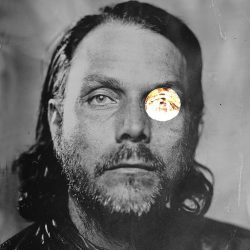Introspective autobiographical folk on Simone Felice’s first solo album in four years.
 Upstate New York artist Simone Felice, a founding member of The Felice Brothers and The Duke & The King, wanders through dark autobiographical territory on his fourth solo album. Describing his longing for past things he can’t have again as well as longing for things he has never experienced necessitates using non-English words like “hiraeth” and “Sehnsucht” to approximate the ache that haunts ‘All The Bright Coins.’ The sound of Felice’s rich voice and guitar (his and Kieran Hebden’s) is sparse and unguarded, with additional piano and the palette-lightening backing vocals of The Webb Sisters and his brothers Ian and James. Felice is openly telling the unfiltered story of his life, however painful it is to hear. What started as the last song he intended to write (‘Puppet’) turned into a continuing string of retrospective songs until there were enough for an album. It wasn’t his last song in a suicide note kind of way, but because he hadn’t written his own material in quite some time and wasn’t sure he still had it in him. In recent years he’s been working successfully as an in-demand producer for artists like Bat for Lashes and Lana Del Rey. Even so, ‘Puppet’ is the equivalent of flipping the bird to everyone on one’s last day of work or on the way out of town for the very last time.
Upstate New York artist Simone Felice, a founding member of The Felice Brothers and The Duke & The King, wanders through dark autobiographical territory on his fourth solo album. Describing his longing for past things he can’t have again as well as longing for things he has never experienced necessitates using non-English words like “hiraeth” and “Sehnsucht” to approximate the ache that haunts ‘All The Bright Coins.’ The sound of Felice’s rich voice and guitar (his and Kieran Hebden’s) is sparse and unguarded, with additional piano and the palette-lightening backing vocals of The Webb Sisters and his brothers Ian and James. Felice is openly telling the unfiltered story of his life, however painful it is to hear. What started as the last song he intended to write (‘Puppet’) turned into a continuing string of retrospective songs until there were enough for an album. It wasn’t his last song in a suicide note kind of way, but because he hadn’t written his own material in quite some time and wasn’t sure he still had it in him. In recent years he’s been working successfully as an in-demand producer for artists like Bat for Lashes and Lana Del Rey. Even so, ‘Puppet’ is the equivalent of flipping the bird to everyone on one’s last day of work or on the way out of town for the very last time.
Felice says, “I began writing ‘All The Bright Coins’ in 2019. It had been several years since I had written anything of my own, as I’d felt called to produce records and write with other artists I love. Then one rainy morning I wrote ‘Puppet,’ a mainly autobiographical tune about the dark, empty, and farcical side of being an underground touring troubadour most of my adult life. Part of me felt as though perhaps this should, and would, be the last Simone Felice song I’d ever put out, ‘Puppet stand, Puppet bow,’ a final curtain call. But then a few months later I wrote Prisoner, and then Bare Trees. The ‘Heat’ (that’s what myself and a few close friends call it: that sweet, painful, ungovernable whisper) was with me once again. So I began to imagine an album where, through thinly veiled riddles, I could loosely tell the story of my life: a melancholy kid from a weird mountain town in upstate New York, old man flew the coop, mom on food stamps valiantly keeping afloat and unknowingly baptizing the kid in Joni Mitchell and The Beatles, birth defects that turned into emergency surgeries, a little black book with my poems in, a bag with a toothbrush and a comb, an interminable highway, underground records, platinum records, feast and famine, not the best singer, not the most gifted musician, but the kid could write rhymes, the kid could tell ghost stories.”
If that description sounds like fragments of a Beat Generation-inspired “pome,” then the spoken word tracks – ‘World’s Fair,’ ’90s’, ‘All the Kings of Earth,’ and ‘Bare Trees’ – interspersing the songs should come as no surprise. Felice’s first public performances were readings at poetry slams during the ’90s in Manhattan. ‘All the Kings of Earth’ slyly references those in power politically and financially in the world, like the section of Allen Ginsberg’s ‘Howl’ that yells about the creeping influence of Moloch.
There are nostalgic cultural references on ‘90s’ and ‘Moonlight Promises’ (like Pixies) with a wistful look back at his rustic youth, playing music for fun, and eventually getting a record deal in NYC with his brothers. The success of his early career is spiked with the recurrent theme of disillusionment. ‘Radio Silence’ is breathtakingly melancholy. ‘90s’ precedes ‘No Tomorrows,’ with his brother Ian on ‘70s group harmony backup vocals, laying bare his struggles with fame and prosperity. Elsewhere on the album, when he scoffs at the concept of a $200,000 kitchen, he immediately conjures an image of one of those trendy gray ones with the ugly quartz countertops.
“How many tears can you hide in a smile?” Felice asks on ‘Year Around the Sun.’ There’s no answer to that question by the end of the gentle closing song ‘After the Rain,’ but what is clear is that he has no intention of hiding anything anymore.


